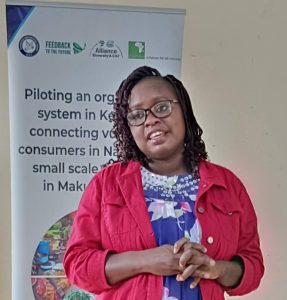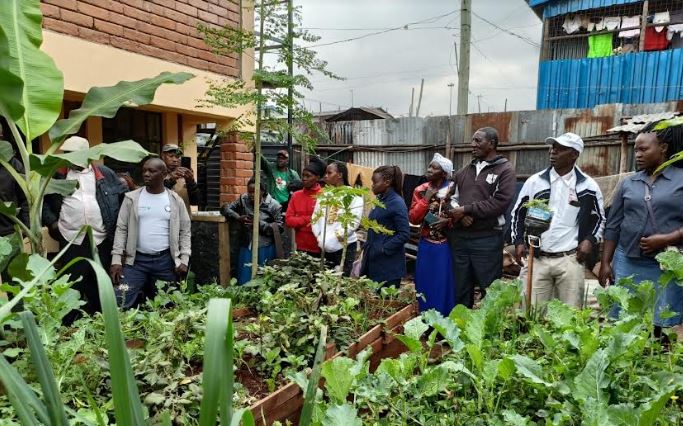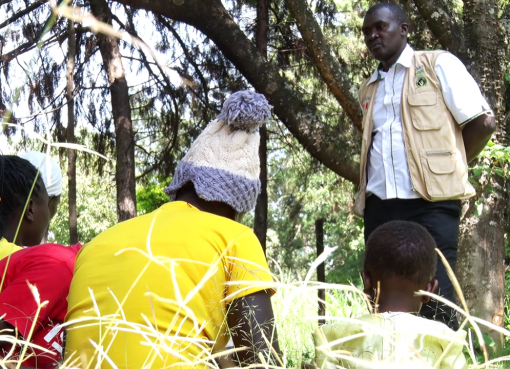This community dialogue is part of DAT’s ongoing campaign to raise awareness among the general public about the importance of consuming safe, produced foods through agroecology and organic farming and linking with general human health and the management and prevention of diabetes and other Non-Communicable Diseases (NCDs)
The dialogue was organised in partnership with the Makadara Sub County Department of Health Management in the Mukuru Skills Training Centre.
The event targeted residents from Lunga Lunga Square, Ridon, Donholm, Daima, Riverside, Kingstone, and Uchumi units of Viwandani Ward, a vibrant low-income settlement nestled within Nairobi County.

Co-founder and Team Lead at Diabetes Awareness Trust, Hannah Kigamba, speaking during the event, said safely produced foods are those grown, harvested, and sold in ways that ensure they remain clean and free from harmful substances.
“DAT has focused on fruits and vegetables that are cultivated without the use of harmful chemicals and are handled in ways that prevent contamination by germs,” said Kigamba.
“Eating unsafe food that has been exposed to toxic chemicals has been linked to serious illness, including various types of cancer,” she said, adding that by consuming healthy, safe foods, you can reduce your risk and enjoy a longer, healthier life.
Kigamba said the organisation embarked on a mission to transform the Viwandani community by partnering with local health workers and community members set out to bridge the gap between health and safe food production, with a vision of enhancing the overall wellbeing of the community.
“The dialogue focuses on understanding community needs with the aim of actively involving the community in identifying needs, gaps, and challenges faced by the residents,” she said.
She said the community dialogue initiatives are part of a consortium project dubbed piloting an organic food system in Kenya, by connecting vulnerable consumers in Nairobi with small-scale producers in Makueni County.
The project is coordinated by Alliance Bioversity & CIAT, implemented by Diabetes Awareness Trust (DAT) and Feedback to the Future (FttF), and funded by the Biovision Foundation, aiming to empower residents to take the reins of their health.
She said one particular exciting aspect of this project is the establishment of organic kitchen gardens within a local health centre in Viwandani that enable residents to have access to fresh organic vegetables.
“This kitchen garden also provides a practical learning tool for the community, allowing residents to replicate what they learn at home,” she said, adding that sustainable farming practices have not only improved the health of the community but also revitalised the community spirit.
She further said the organisation has been encouraging the public to screen for NCDs such as diabetes and hypertension by visiting health centres for early detection and prevention.
“Early diagnosis allows for timely intervention, helping to manage or even prevent the progression of these conditions,” she divulged.
Kigamba said some of the gaps identified in creating awareness on diabetes and other NCDs include limited access to information about healthy living lifestyle choices and disease prevention strategies and high consumption of processed and sugary foods driven largely by their affordability and convenience.
Others include limited availability of affordable organic fresh vegetables, and other healthy food options in local markets, challenges in accessing affordable medication, and regular checkups, especially blood sugar monitoring, among others.
“The community dialogue addresses gaps identified by DAT during field visits that affect health and nutrition outcomes by proposing actionable solutions,” she further said.
One of the participants, John Wachira, 65 years old, who has been living with diabetes for 32 years, emphasized on how vital it is for consumers and people managing diabetes, hypertension, and other NCDs to be mindful of the food they eat and how it is produced.
He said, “Us diabetics, we do not just eat; we have to be keen on what we eat because it has an impact on our health,” adding that learning about monitoring blood sugar levels and blood pressure became second nature to him.
He acknowledges that adopting healthier food practices isn’t without its challenges. He cites the limited variety of organic foods on the market and the constrictions posed by limited resources. Additionally, distinguishing between organic and inorganic foods on the market can be tricky.
“Despite these challenges, I am committed to my journey towards better health.” He said, adding that he has gained invaluable information and insights into managing diabetes and hypertension through healthy eating thanks to DAT and partners.
By Anita Omwenga





